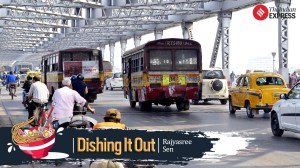Protesting Ladakh bodies welcome formation of Centre’s panel to consider demands
Ladakh has been seeking full statehood, Sixth Schedule implementation, as well as separate LS seats for Kargil and Leh, following abrogation of Article 370, separation from J&K; leaders say willing to give panel a chance
 The 17-member committee will be headed by Minister of State for Home Affairs Nityanand Rai, and will include Ladakh Lieutenant Governor R K Mathur, its sole MP J T Namgyal of the BJP, chairmen of the Leh and Kargil Autonomous Hill Councils, among other. (File photo)
The 17-member committee will be headed by Minister of State for Home Affairs Nityanand Rai, and will include Ladakh Lieutenant Governor R K Mathur, its sole MP J T Namgyal of the BJP, chairmen of the Leh and Kargil Autonomous Hill Councils, among other. (File photo) DRAWING a mixed response, the Centre has constituted a high-powered committee to look into the demands of Ladakh, after over two years of continued protests in the Union Territory, which was carved out of Jammu and Kashmir following the abrogation of Article 370 in August 2019.
The decision, coming days ahead of a demonstration planned by Ladakh bodies in Jammu on January 7, seeks to address demands of the people and political leadership regarding full statehood, safeguards under the Sixth Schedule, early recruitment for the Ladakh Public Service Commission, and separate Lok Sabha seats for Kargil and Leh.
The Kargil Democratic Alliance and the Apex Body Leh, the two main organisations of the Kargil and Leh districts of the UT, respectively, have been spearheading the protests since August 2020.
Ladakh currently has one MP, and with no provision of an Assembly now, is run by its two Autonomous Hill Councils, for Leh and Kargil. Under the new regulations following the erstwhile state’s bifurcation, while the UT of J&K is to have an Assembly, Ladakh was deemed to be without a legislature since it essentially comprises only two districts and has a very small population (just over 2.74 lakh).
However, the government is conscious of the risks of continuing protests given Ladakh’s strategic importance due to its location along the Line of Actual Control (LAC) with China. One of the ongoing major flashpoints with Beijing is over China’s incursions into Ladakh.
On January 2, the J&K and Ladakh Division of the Ministry of Home Affairs issued the order constituting the high-powered committee to discuss measures to protect Ladakh’s “unique culture and language”, considering its geographical location and strategic importance. Its mandate includes “ensuring the protection of land and employment for the people of Ladakh”.
The 17-member committee will be headed by Minister of State for Home Affairs Nityanand Rai, and will include Ladakh Lieutenant Governor R K Mathur, its sole MP J T Namgyal of the BJP, chairmen of the Leh and Kargil Autonomous Hill Councils, and the Ministry’s Joint Secretary for J&K and Ladakh Affairs, among others.
There is no intimation so far about when the committee will hold its first meeting.
Among the criticisms directed at the panel is that it has no representative from the Sunni community – a minority in the Shia-dominated Ladakh. While the Leh district is Buddhist-dominated, Kargil is majority Muslim.
Former J&K minister and senior Congress leader Nawang Rigzin Jora, who is a member of the committee, said: “We hope that it can address our concerns. Along with inclusion in the Sixth Schedule, the demand for statehood is being forcefully articulated, more so by us members from Kargil.”
Jora said that just inclusion in the Sixth Schedule would provide two district-level set-ups, with administrative control still with the L-G and the bureaucrats. “The bureaucracy does not represent the aspirations of the people. For that we need a Legislature and a Council of Ministers,” he said.
The Sixth Schedule under Article 244 of the Constitution seeks to safeguard the practices of tribal populations through the creation of autonomous councils which can frame laws on land, health and agriculture. Assam, Meghalaya, Tripura and Mizoram have such councils.
Jora also admitted that there was no point in continuing to seek the return of special status to J&K or of Ladakh’s inclusion in the same. “Bifurcation is done and dusted. Our demands for the UT are in lines with the UT of Pondicherry.”
Sajjad Kargili of the Kargil Democratic Alliance, who is also a member of the Centre’s panel, said that with the abrogation of Article 370 matter in the Supreme Court, there was little they could do about it. “We have not accepted the abrogation. However, we cannot achieve that objective politically since the matter is sub-judice. But we are united in the struggle for statehood and Sixth Schedule, and will put forth these concerns before the committee.”
On criticism regarding the panel, Kargili said he was willing to give it a chance, calling the committee an “opportunity” and “a window opened by the Government of India”. “There is no excuse to not participate in the dialogue with sincerity.”
- 01
- 02
- 03
- 04
- 05































